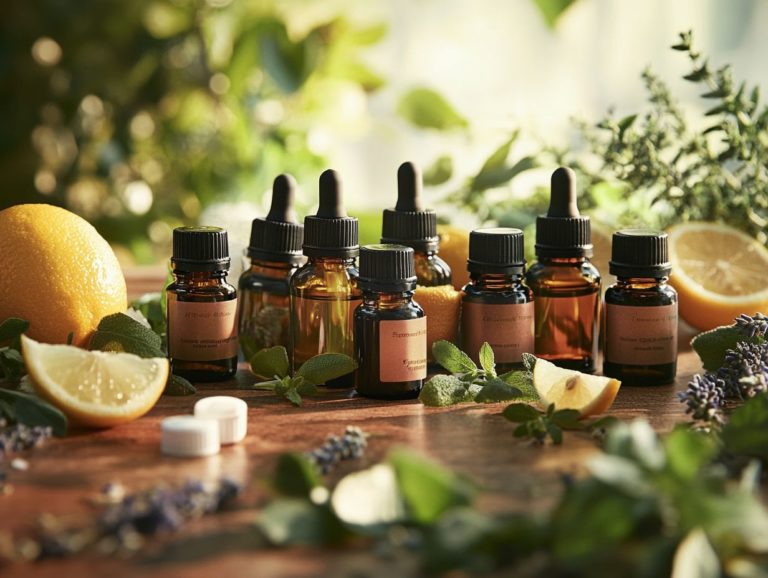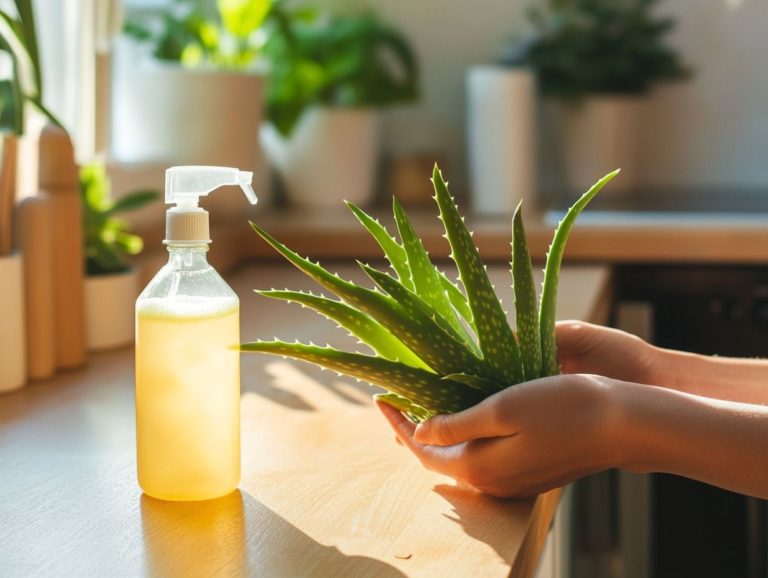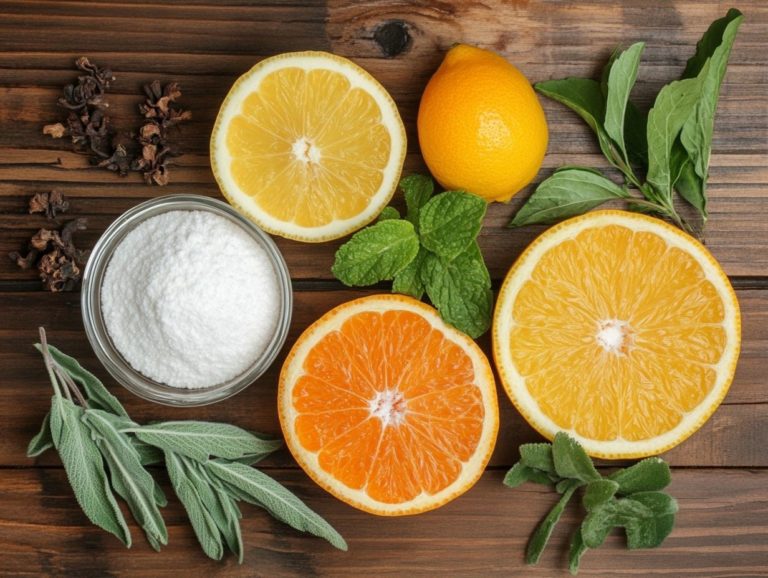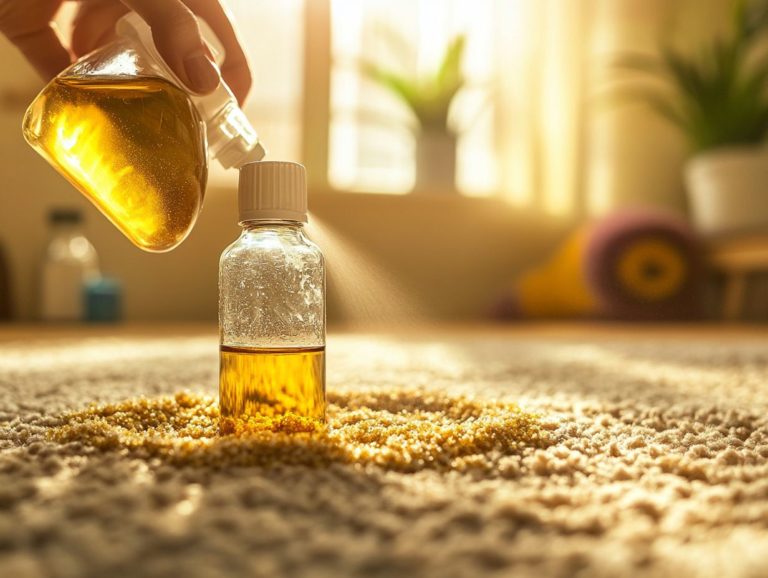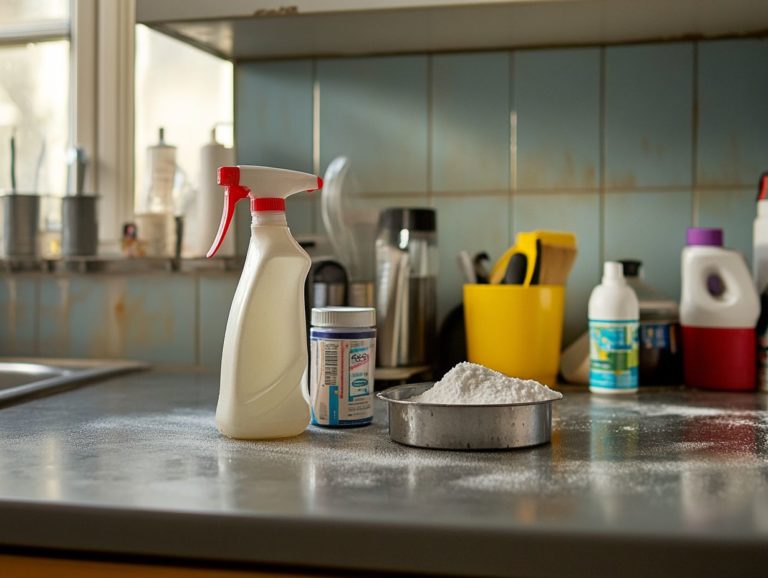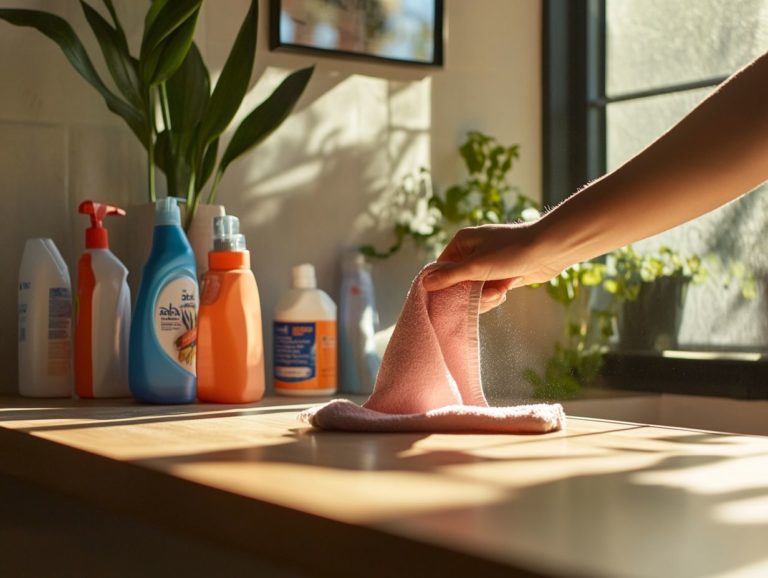How to Dilute Essential Oils for Cleaning?
People love essential oils for their wonderful scents. They re also powerful allies for cleaning.
In this article, you will uncover the myriad benefits of incorporating essential oils into your cleaning regimen, learn the art of proper dilution, and explore various methods and dilution rates that guarantee both safety and efficacy.
You will be introduced to the finest essential oils for cleaning, provided with DIY cleaning recipes for crafting your own solutions, and informed about vital safety precautions to consider.
Transform your cleaning routine today with the amazing power of nature and pure essential oils!
Contents
- Key Takeaways:
- What Are Essential Oils?
- How to Dilute Essential Oils for Cleaning?
- What Are the Safety Precautions and Possible Side Effects of Using Essential Oils for Cleaning?
- How to Use Diluted Essential Oils for Cleaning?
- What Are Some DIY Cleaning Recipes Using Diluted Essential Oils?
- Frequently Asked Questions
- What are essential oils and why are they used for cleaning?
- How should I dilute essential oils for DIY cleaning?
- What is the best way to mix essential oils with water for cleaning?
- Are there any essential oils that should not be used for cleaning?
- Can I mix different essential oils together for cleaning?
- Are there any safety precautions to keep in mind when using essential oils for cleaning?
Key Takeaways:
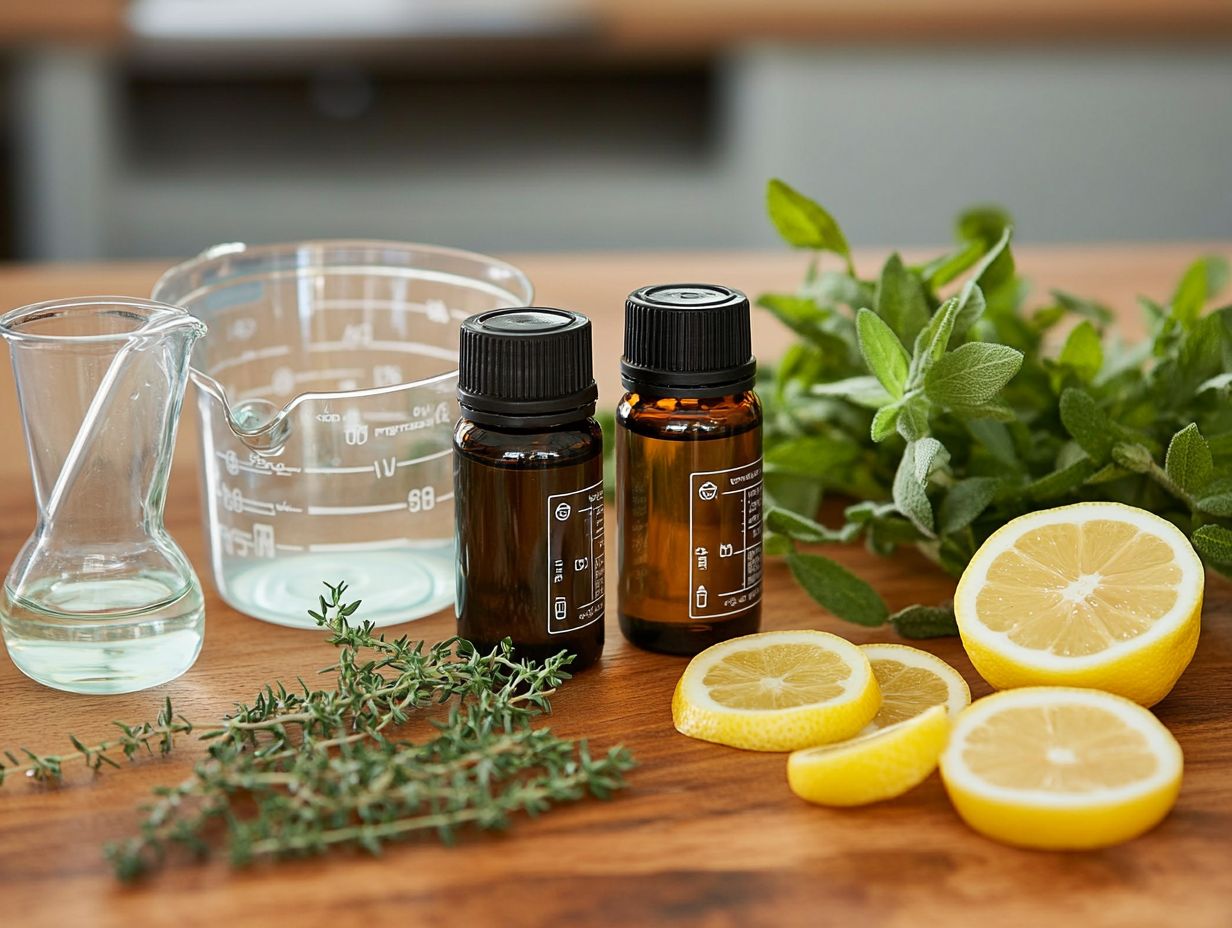
- Use essential oils for their cleaning benefits and natural scent.
- Dilute essential oils properly to avoid harsh reactions and maximize effectiveness.
- Explore different DIY cleaning recipes using diluted essential oils for a more eco-friendly and chemical-free solution.
What Are Essential Oils?
Essential oils are remarkable, highly concentrated compounds extracted from plants, celebrated for their enchanting aromas and impressive health benefits. These potent oils can be derived from various parts of the plant leaves, flowers, bark, and roots and they offer a multitude of applications, ranging from aromatherapy massage to natural cleaning solutions.
The versatility of essential oils contributes to their popularity in holistic health practices, cleaning products, and personal care items. When you choose high-quality pure essential oils, like those offered by New Directions Aromatics, you re not just enhancing your wellness; you re also promoting a healthier environment around you and addressing various health conditions.
What Are the Benefits of Using Essential Oils for Cleaning?
Using essential oils for cleaning elevates the fragrance of your products and offers a wealth of benefits, including antibacterial and antifungal properties. Oils like tea tree, lemon, and eucalyptus possess natural disinfectant abilities, making them perfect for DIY cleaning solutions. By incorporating these oils into your routine, you can enhance the overall effectiveness while fostering a healthier indoor environment.
The calming effects of lavender can turn cleaning into a more enjoyable experience, creating a soothing atmosphere as you work.
Essential oils also fight viruses and bacteria, offering a safer choice than harsh commercial cleaners.
For example, a mixture of vinegar, water, and a few drops of peppermint essential oil makes an excellent all-purpose cleaner, effectively combating grime and odors. A blend of baking soda, water, and tea tree oil can create a potent scrub for stubborn stains, ensuring your surfaces are clean and free from harmful residues. You can also use cinnamon and rosemary for their powerful antimicrobial properties.
Embracing these natural options enhances your cleaning process and promotes environmental sustainability and personal well-being.
How to Dilute Essential Oils for Cleaning?
Diluting essential oils is an essential step for safe and effective usage, particularly when integrating them into cleaning products or for topical application. Concentrated oils can lead to skin irritation if they aren’t properly diluted, so grasping the appropriate dilution rate is crucial.
A carrier oil, such as jojoba oil, coconut oil, or sweet almond oil, is used to dilute essential oils for skin application. For cleaning, water or vinegar serves as a common base. Proper dilution not only enhances the efficacy of essential oils but also significantly reduces the risk of adverse reactions.
Start your journey to a fresher, cleaner home with essential oils now!
What Are the Different Methods of Diluting Essential Oils?
You have several effective methods for diluting essential oils, each tailored to specific applications, whether you’re focusing on cleaning, aromatherapy, or skincare. Common techniques involve mixing essential oils with a carrier oil, which is a neutral oil like sweet almond, jojoba oil, or coconut oil, for topical use, or blending them with water or vinegar for cleaning.
These methods ensure that essential oils retain their aromatic properties and effectiveness while minimizing the risk of skin irritation or adverse reactions. Choosing the right method is essential for maximizing the benefits of essential oils.
Understanding the various techniques enhances their effectiveness across different contexts. For instance, when tackling cleaning tasks, combining essential oils with vinegar capitalizes on their antimicrobial properties, creating a powerful disinfectant for surfaces. For skincare, blending essential oils with carrier oils promotes better absorption and softens any potential harshness from direct application.
Always observe safety guidelines: perform a patch test before widespread use to prevent allergic reactions. Consider using aloe vera for its soothing properties in skincare applications. While vinegar and water excel in cleaning, carrier oils are more appropriate for skincare, underscoring the importance of strategic selection based on your intended purpose.
What Are the Recommended Dilution Ratios for Cleaning?
When incorporating essential oils into your cleaning products, follow these dilution ratios to unleash the full power of essential oils in your cleaning routine:
- For general cleaning, use a typical dilution ratio of 1-2% essential oil to carrier oil or water. This means for every 1 ounce of carrier liquid, add approximately 6-12 drops of essential oil.
- For tougher jobs like disinfecting surfaces, a stronger dilution of 3-5% essential oil can be beneficial, allowing oils like tea tree or eucalyptus to shine.
- For delicate items such as glass or polished surfaces, a gentler 0.5-1% dilution will help prevent potential damage.
It s also wise to consider the type of essential oil you’re using; for instance, citrus oils tend to be more potent and require careful measurement, while softer oils like Chamomile may offer more flexibility with their ratios. Adjust these ratios according to the specific cleaning task and chosen essential oils to maximize cleaning efficacy while minimizing potential issues.
What Are the Best Essential Oils for Cleaning?
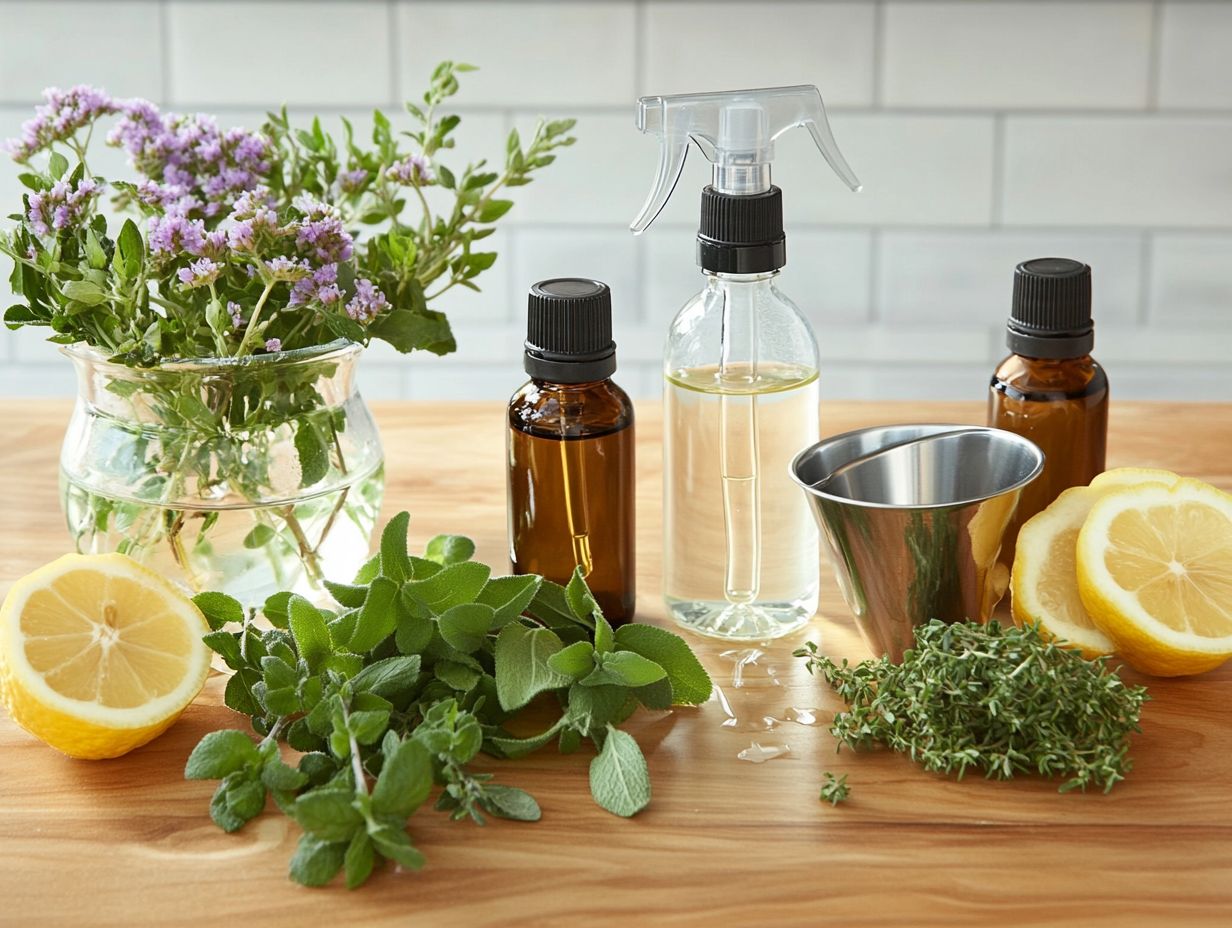
When selecting the best essential oils for cleaning, you have several standout options that boast natural disinfectant properties and delightful aromas. Oils like tea tree, known for its antimicrobial prowess, and lemon, famous for its invigorating scent and degreasing power, are perfect for a variety of cleaning tasks. Pine and thyme essential oils are also excellent choices due to their powerful cleaning properties.
Lavender not only fills your space with a soothing fragrance but also offers calming benefits, making cleaning a more enjoyable task. Other essential oils, like eucalyptus and peppermint, can boost your cleaning products with their strong scents, contributing to a fresher atmosphere.
Transform your cleaning routine with these amazing essential oils! For example, tea tree oil excels at fighting mold in damp areas like bathrooms. To tackle stubborn grease, try mixing lemon essential oil with vinegar to create a powerful all-purpose cleaner. Eucalyptus oil s antibacterial properties make it ideal for sanitizing kitchen surfaces, while a few drops of peppermint can refresh the air as it purifies. Grapefruit essential oil can also be utilized for its refreshing scent and cleansing properties.
For those who enjoy DIY projects, creating a simple floor cleaner is easy. Combine water with vinegar and a few drops of lavender for both cleanliness and a welcoming scent. Adding a few drops of bergamot can bring an extra lovely fragrance. These combinations not only ensure a sanitary home but also cultivate a refreshing environment, enhancing your daily cleaning routine.
What Are the Safety Precautions and Possible Side Effects of Using Essential Oils for Cleaning?
When using essential oils for cleaning, prioritizing safety precautions is crucial to avoid adverse reactions and create a secure environment, particularly for children and pets. Some essential oils can irritate the skin if applied undiluted, so it s important to do a small test on your skin before using. Always choose pet-safe oils to ensure your home remains safe for your furry friends.
Be aware that some oils, like bergamot and lemon, are photosensitive. They can provoke skin reactions when exposed to sunlight, so handle them with care. Other photosensitive oils include grapefruit and cinnamon. It s vital to select pet-safe oils, as some essential oils can be toxic to animals, ensuring that your home remains a safe haven during your cleaning routine.
While essential oils can provide remarkable benefits, they may also carry potential side effects if not used correctly. Common issues include skin irritation or allergic reactions, especially if the oils haven t been properly diluted or if you are sensitive to certain compounds. Be cautious with photosensitive oils like lemon and bergamot, as they can cause skin reactions when exposed to sunlight. Some oils, like chamomile, are gentler and beneficial for those with sensitive skin.
To further safeguard yourself, perform a patch test before applying any new oil to your skin. Dilute a drop of essential oil with a carrier oil, such as jojoba oil, and apply it to a small area to monitor for any reactions. If you notice redness, itching, or irritation, it s best to stop using it. Stay alert for common allergic reactions, such as headaches or respiratory issues, that might arise from inhaling certain oils.
If any adverse effects occur, seek fresh air and consider using antihistamines for relief. For persistent issues, consulting a healthcare professional is advisable, ensuring your journey with essential oils is both safe and enjoyable.
How to Store Diluted Essential Oils Safely?
With these tips, your home will not only be clean but also filled with wonderful scents! Ready to start cleaning with essential oils? Gather your supplies and get started today!
Tips from New Directions Aromatics
Proper storage of your diluted essential oils is crucial to preserving their potency and safety over time. Opt for dark glass bottles to shield them from light exposure, which can diminish their quality. By keeping these bottles in a cool, dry environment away from heat sources, you can significantly extend how long they last.
Ensure that all containers are tightly sealed to prevent evaporation or contamination. This helps maintain the integrity and effectiveness of your essential oils for your future cleaning endeavors.
Accurate labeling of your containers is essential for effortless identification. Make sure your labels are clear and concise, detailing the type of oil, dilution ratio, and date of creation. This way, you’ll have quick access to your oils without any second-guessing.
Always choose glass over plastic to keep your essential oils safe! Certain essential oils can leach harmful chemicals from plastic, undermining their beneficial properties.
If you enjoy creating blends, consider keeping separate bottles for each oil. This not only simplifies organization but also enhances your experience, allowing you to tailor your use of these powerful natural remedies to your specific preferences.
How to Use Diluted Essential Oils for Cleaning?
Utilizing diluted essential oils for cleaning can elevate your routine, enhancing both its effectiveness and enjoyment while embracing a more natural approach to household cleanliness.
There are numerous ways to incorporate these oils into your cleaning regimen. You can add them to homemade cleaning products or use them in diffusers to create an aromatic atmosphere.
By understanding the best practices for application, you can maximize the benefits of these potent oils. This ensures not only effective cleaning results but also a healthier environment free from harsh chemicals.
What Are the Different Ways to Use Diluted Essential Oils for Cleaning?
There are countless ways for you to incorporate diluted essential oils into your cleaning routine, making it a seamless addition to your daily life. One highly effective method is creating a versatile all-purpose cleaner. To make it, mix 10 drops of lemon oil with 1 cup of vinegar and 1 cup of water in a spray bottle ideal for tackling various surfaces around your home.
You can also elevate your laundry by adding a few drops of essential oils for a refreshing scent and extra antibacterial benefits. Using a diffuser while you clean enhances the entire experience with a delightful aroma.
When it comes to scrubbing away tough grime in kitchens and bathrooms, homemade scrubs infused with essential oils change the game for cleaning. For example, mixing baking soda with oils like lavender or eucalyptus results in a powerful scrub that leaves surfaces sparkling clean.
For your glass cleaning needs, a simple concoction of water, vinegar, and citrus essential oils guarantees streak-free results every time. If you’re looking for a natural air freshener, blend essential oils with water in a spray bottle to effectively eliminate odors and create a refreshing atmosphere throughout your home.
Together, these methods ensure not just a pristine environment but also a natural approach to cleaning that is both safe and effective.
What s your favorite way to use essential oils for cleaning? Share your tips below!
How Often Should You Use Diluted Essential Oils for Cleaning?
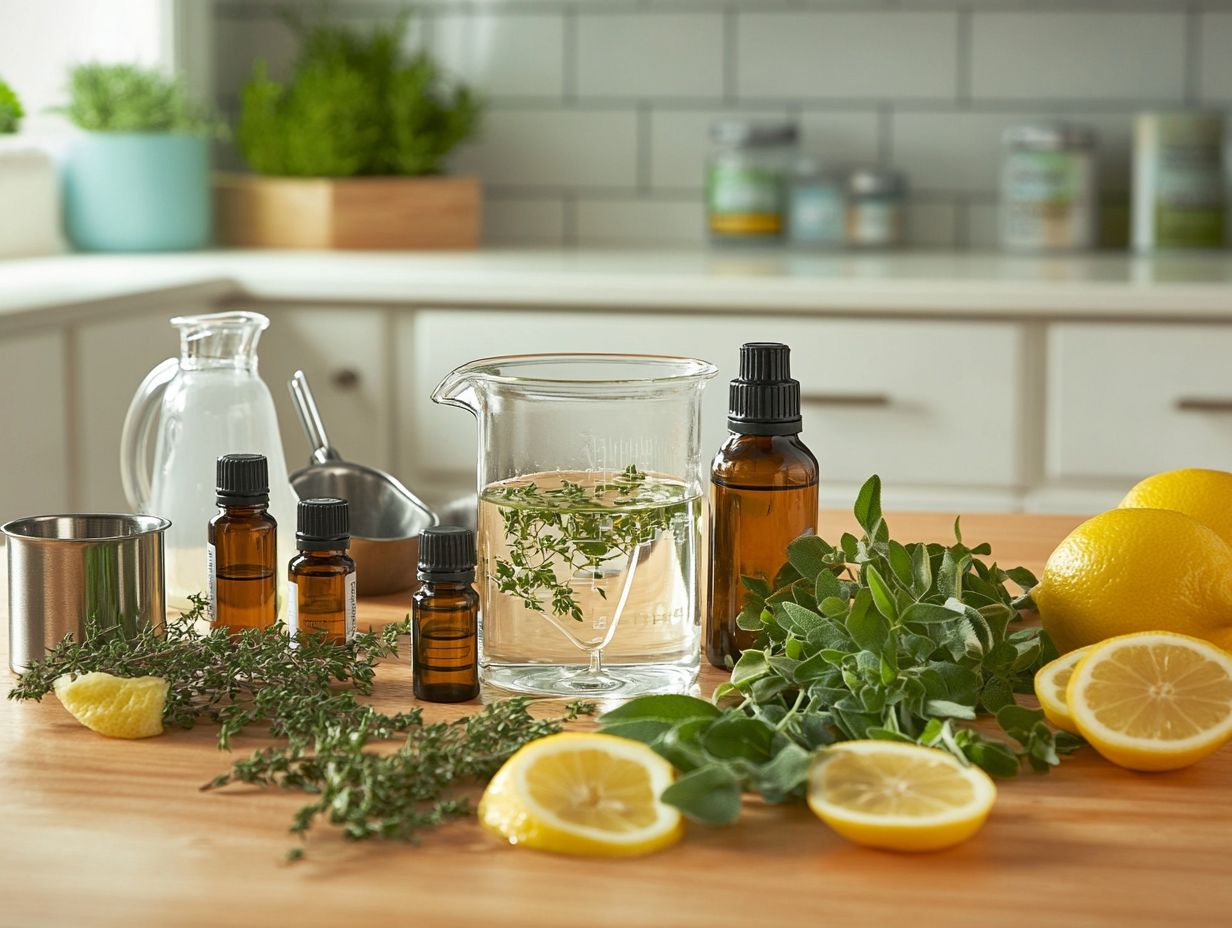
The frequency with which you use diluted essential oils for cleaning is largely determined by the specific cleaning task at hand and the type of surface you’re treating. In high-traffic areas or surfaces that gather dirt and bacteria quickly think kitchens and bathrooms it s wise to incorporate diluted essential oils into your routine daily. You may also consider using them several times a week.
For less frequented spaces, a weekly or biweekly approach may suffice. By understanding the unique characteristics of each surface, you can tailor an effective cleaning schedule.
The strength of essential oils in disinfection can vary based on their concentration and application method. Take surfaces that are frequently touched, like countertops and light switches; these deserve more of your attention to keep them sanitized and smelling fresh. On the other hand, items such as furniture or decorative pieces can afford a more laid-back cleaning regimen. By assessing how often these surfaces are used, you can adjust your cleaning strategies effectively, ensuring that essential oils fulfill their role without unnecessary overuse.
What Are Some DIY Cleaning Recipes Using Diluted Essential Oils?
Creating your own DIY cleaning recipes with diluted essential oils gives you the power to tailor your cleaning products to your unique preferences while eliminating harsh chemicals from your living space. Consider using resources from New Directions Aromatics to find high-quality essential oils for your DIY projects.
Imagine crafting an all-purpose cleaner using a blend of vinegar, water, and essential oils like tea tree or lavender this not only disinfects but also infuses your home with delightful aromas.
You can also whip up a natural disinfectant by combining essential oils with witch hazel a natural astringent derived from the witch hazel plant and water, presenting a chic, eco-friendly alternative to commercial cleaners.
These recipes work wonders and make your cleaning routine enjoyable and fun!
How to Make an All-Purpose Cleaner with Diluted Essential Oils?
Don’t wait! Craft your own powerful DIY cleaning solution today by combining 1 cup of distilled water, 1 cup of white vinegar, and 10-15 drops of essential oils think lemon and tea tree for their antibacterial prowess. Remember to give it a good shake before each use, then spray it on various surfaces, wiping with a cloth to achieve a sparkling clean finish. This amazing recipe not only cleans effectively but also fills your home with a wonderful, refreshing scent!
If you desire alternative scents, options like lavender, eucalyptus, or peppermint can be delightful substitutes, each offering its own unique benefits and fragrances.
To boost your cleaning power, especially for those stubborn stains, consider adding a tablespoon of baking soda to the mixture, ensuring that you stir until it dissolves completely.
For storage, opt for a glass spray bottle; this choice prevents any chemical reactions that might occur with plastic over time. Stow the cleaner in a cool, dark place to preserve its efficacy, and don t forget to label the bottle clearly to avoid any mix-ups with other household products.
How to Make a Natural Disinfectant with Diluted Essential Oils?
Creating a natural disinfectant with diluted essential oils is a brilliant way to keep your spaces clean without resorting to harsh chemicals. To craft this effective DIY cleaner, mix 1 cup of water, cup of witch hazel, and 15-20 drops of disinfecting essential oils like tea tree and lavender. This delightful concoction not only disinfects surfaces but also leaves behind a lovely aroma that elevates your cleaning routine.
Pour it into a spray bottle, give it a good shake, and spray onto surfaces. Wipe down with a cloth for a refreshingly natural clean.
Feel free to customize the essential oils based on your preferences or what you have handy; eucalyptus or lemon oils are fantastic alternatives that also boast incredible disinfecting properties. If you adore citrus scents, don t hesitate to experiment with orange or grapefruit essential oils. These can invigorate your space while tackling germs.
Always test a small, inconspicuous area when applying essential oils on various surfaces to avoid any unpleasant surprises. Keeping track of how different oils perform will allow you to refine your mixture and discover the ideal combination that meets your cleaning needs while creating a welcoming ambiance in your home.
How to Make a Grease-Cutting Cleaner with Diluted Essential Oils?
A grease-cutting cleaner made with diluted essential oils is an exceptional solution for conquering stubborn kitchen messes while keeping things smelling fresh. To whip up this effective DIY cleaner, combine 1 cup of warm water, cup of dish soap, and 15 drops of essential oils like lemon and eucalyptus, known for helping to cut grease. You can add a few drops of chamomile for a calming scent.
Mix it all together thoroughly, then transfer the concoction to a spray bottle for effortless application. Watch this powerful solution slice through grease like magic while leaving behind a delightful aroma, making your kitchen cleaning tasks easier and more enjoyable. For an added touch, consider including a bit of jojoba oil to enhance the moisturizing properties of your DIY cleaner.
For best results, gently shake the spray bottle before each use to ensure the ingredients are well-blended. When applying the cleaner, focus on areas known for grease buildup, such as stovetops and backsplashes. Allow the solution to sit for a minute or two on stubborn stains so it can work its magic before you wipe it away with a clean cloth.
If you re in the mood for a different fragrance, consider using oils like tea tree, lavender, or even sweet orange. Each provides a wonderful scent without sacrificing cleaning power. Companies like New Directions Aromatics offer a variety of high-quality essential oils to choose from. Always test the cleaner on a small, inconspicuous area first, especially on delicate surfaces, to ensure it s a perfect match.
Frequently Asked Questions
What are essential oils and why are they used for cleaning?
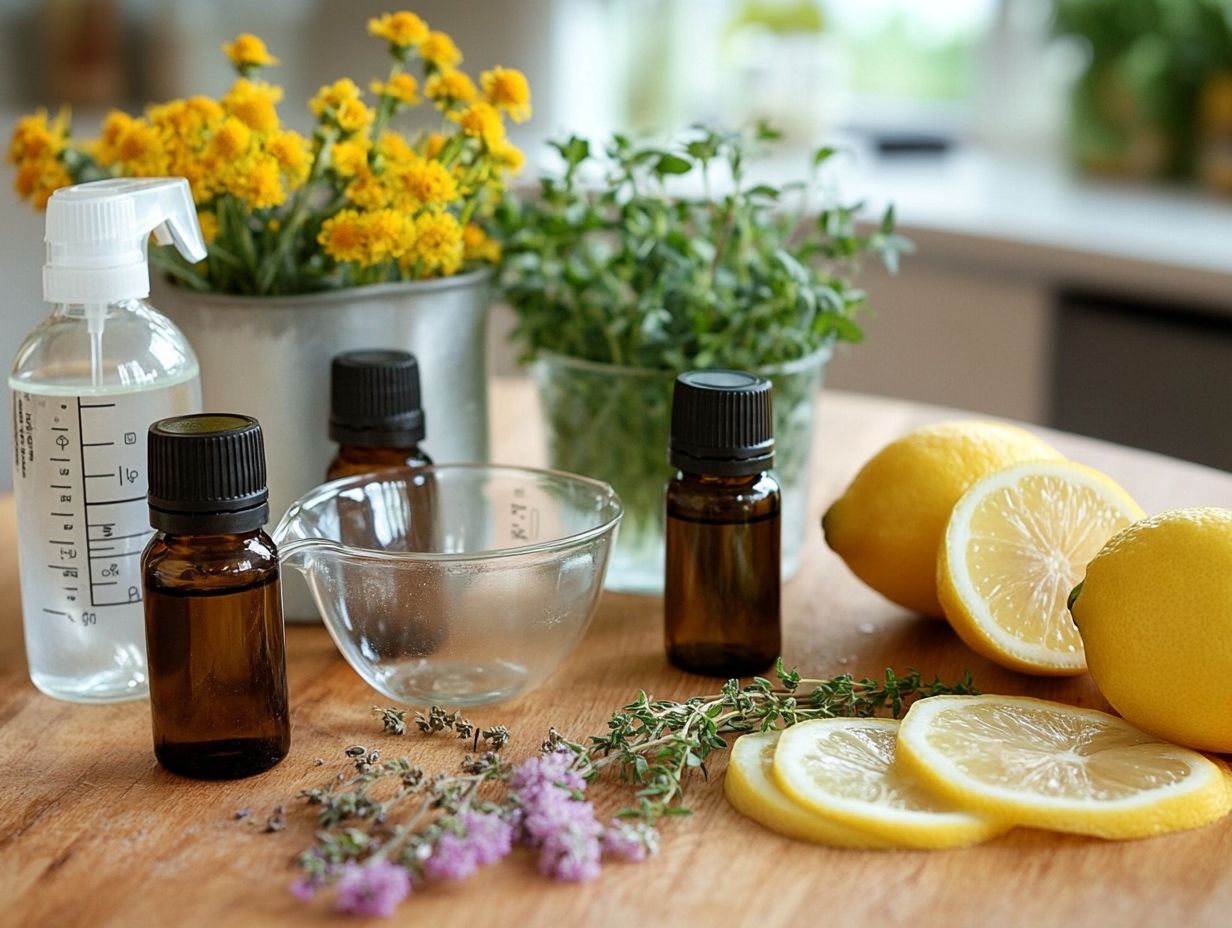
Essential oils are concentrated plant extracts that have various therapeutic and cleaning properties. They are used in cleaning because they are natural, non-toxic, and have antimicrobial properties.
How should I dilute essential oils for DIY cleaning?
The most common dilution ratio for cleaning is 1 part essential oil to 10 parts water. This can be adjusted based on the strength of the oil and the desired potency.
What is the best way to mix essential oils with water for cleaning?
The most effective way is to mix the essential oils with an emulsifier, such as a natural liquid soap, before adding water. An emulsifier helps the oils disperse evenly in the water for proper dilution.
Are there any essential oils that should not be used for cleaning?
Yes, some essential oils, such as citrus oils, can damage certain surfaces and should be used with caution. It is always best to do a patch test before using any essential oils for cleaning.
Can I mix different essential oils together for cleaning?
Yes, you can mix different essential oils to create a custom cleaning blend. Just make sure to follow the proper dilution ratio and test the blend on a small area before using it on a larger surface.
Are there any safety precautions to keep in mind when using essential oils for cleaning?
Yes, essential oils are powerful! They are highly concentrated and can cause skin irritation or allergic reactions if not used correctly.
Wear gloves and work in a well-ventilated area. Always keep essential oils out of reach of children and pets.

